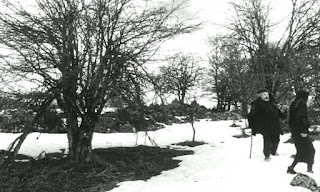There are those that will argue that The Chimes at Midnight (or Falstaff, as it was released in some circles) is Orson Welles' finest work, surpassing the "Wisdom of the Tribe" consensus that Citizen Kane is his best film. Made during his long period of limited budgets and maximum ingenuity, it is his most personal work and certainly contains his best performance, combining his penchant for theatricality with his most emotionally vulnerable acting. Welles' bombastic veneer is stripped away, presenting a frail strength that is, frankly, a bit breath-taking.
Welles' characters were always larger than life, but, here, that effusiveness is exposed as a facade, a role to be played and then dropped in moments of privacy. It's heart-breaking, even though the character of Sir John Falstaff is considered a comic character in the Shakespeare plays in which he appears. Welles amalgamated those snippets and appearances to form this one film about one of the Bard's most fully-formed background characters.
And it's a tragedy. A dressing-down of a boisterous, profligate windbag who's the life of the party...when there is a party to be had, or made. Without one, well, let's just say that he doesn't do well in an empty hall, and will always be the last one to leave, but resists the clean-up and the putting up of chairs. When the revels have ended, he dies in a way.
It's a great role for an actor, and for Welles, in particular, who seemed to wear an entourage like a cape.
The Criterion Collection put out a lovely presentation of Chimes at Midnight, but one particular Bonus Feature haunts, a talking-head rumination by Simon Callow, who has probably spent more time thinking about Welles than anyone in history. He has written three massive biographies of Welles since 1997, with the fourth...well, he's still working on it. In it, he postulates that Welles saw a lot of his own father in the character of Falstaff; he describes Richard Head Welles as a "Champaign Charlie", who spent his considerable wealth as an inventor on wine, women, and song-halls. Good times. New inventions that went unused, minor successes, but mostly failures, all stewed in an alcoholic haze. When young Orson was enrolled at the Todd School and starting his prolific stage career, his father would show up at the performances, drunk and causing disturbances. Welles was advised to inform his father that he wouldn't see him again until the man stopped drinking.
Of course, that was the last time Welles ever saw his father. There is absolutely no way in which Welles couldn't see the rejection of Falstaff by the newly-crowned King Henry, his former rowdy conspirator, as an echo of the shame of that act. And his Falstaff, rejected, but still brimming with pride at the ascension of the younger man achieving his full potential, is a heart-breaking, bittersweet moment of humiliation.
One other thing about this scene: the character of Shallow—who also appeared in a couple of the Shakespeare plays—is something of a fool, repetitive in speech, and constantly nostalgic for his glory days, which probably never existed in the first place. Falstaff, however, is self-aware enough to know this. But, he lets the older man have his nostalgia...as an act of generosity and empathy. And recognition.
And grace.
The Set-Up: The film is just beginning, although the story has already happened.
Action.
1. ELS: two figures silhouetted against a snowy field cross the frame from left to right. An outcropping of rock in the left foreground and the trunk of a large tree frame the figures. An unaccompanied recorder provides background music. They pass behind the tree.
2. LS: the two figures, one behind the other, approach the camera on the right. The tree now is at the left, and the other trees form a background. The black-clothed figures and the dark trees and rocks are set off against the snow and the light sky. As they approach, the second figure, much larger than the first, can be seen to be walking with the aid of a cane.
JUSTICE SHALLOW: Jesus, the days that we have seen.
JUSTICE SHALLOW: Jesus, the days that we have seen.
SHALLOW: He, he. Do you remember, since we lay all night in the Windmill, in St. George's Field?
(Shallow moves out of the shot frame right)
(Falstaff follows Shallow out of the shot).
3. LS: Falstaff and Shallow enter a low-roofed building, supported by wooden posts. A brazier with a wood fire is in the right foreground.
(A bell begins to toll in the background and continues intermittently through the scene).
4. ELS: Falstaff and Shallow enter at the far end of a large barnlike room. Its timbered beams and roof are visible.
(The camera tracks back slowly as Falstaff and Shallow advance toward it diagonally from right to left, crossing the center of the room).
(Falstaff
and Shallow are now in MS, having just passed under one of the large
beams. Shallow, behind Falstaff, motions him forward.
5. Falstaff's back is silhouetted in MLS at the left, against the light from a blazing fireplace,
as he bends under a low beam and prepares to seat himself in front of the fire.
He sits down on a bench, back to the camera, and Shallow, following, prepares to sit down next to him.
He sits down on a bench, back to the camera, and Shallow, following, prepares to sit down next to him.
SHALLOW: ...by old Nightwork before I came to Clement's Inn.
6. Falstaff at the left in ECU, Shallow at the right in CU, their faces reflecting strong light from the fire.
The Chimes at Midnight (aka Falstaff)
Words by William Shakespeare, Raphael Holinshead, and Orson Welles (Continuity script edited by Bridget Geller Lyons)
The Chimes at Midnight is available on DVD and Blu-Ray from The Criterion Collection.
























Infaithwehave.jpg)


No comments:
Post a Comment